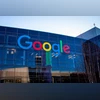The ongoing antitrust trial against Google has entered its final stages, with the Justice Department arguing that the tech giant maintains a monopoly in online advertising technology. The case revolves around Google’s control over the platforms used by publishers and advertisers, with accusations that this dominance allows Google to charge excessive fees. Key testimony came from Google manager Jonathan Bellack, who dismissed his past email warnings about Google’s monopolistic practices as “jet-lagged ramblings.” The court is scrutinizing whether the company’s internal documents and testimonies reflect the true nature of its business practices. The Virginia trial, which began on September 9, is progressing rapidly, with the government nearing the end of its case and Google poised to present its defense soon.
In a significant antitrust case, the judge will soon decide whether Google has an unfair monopoly in online advertising technology. This trial is wrapping up at a federal courtroom in Virginia, where the Justice Department, along with several states, argues that Google has created and maintained a dominant hold on the tools used for buying and selling online ads.
Google, however, argues that the government is focusing too narrowly on specific types of ads, like the rectangular banner ads displayed on web pages. They claim that when looking at the broader online advertising Market, they face stiff competition from social media platforms and streaming services.
Throughout the trial, key testimonies have come from Google managers and executives who have often distanced themselves from their earlier written communications. An important moment in the trial came when Jonathan Bellack, a product manager at Google, dismissed a 2016 email he wrote, which raised concerns about Google’s dominance. On the stand, he described his email as just “late night, jet-lagged ramblings,” insisting that he was merely speculating on why some clients sought alternative options to Google’s technology.
The Justice Department believes these emails reflect a more accurate picture of the company’s practices. They assert that Google’s monopoly allows them to impose high fees on advertisers, capturing a significant portion of the revenue generated from ad impressions.
As the trial progresses, U.S. District Judge Leonie Brinkema has expressed serious concerns about Google’s document retention policies, noting that the company deleted internal communications even after being under investigation. These issues are being closely monitored but no specific penalties have been imposed yet.
The Virginia trial started on September 9, just after a D.C. court deemed Google’s search engine an illegal monopoly. While the ad tech business being debated in this case is not as lucrative as Google’s search operations, it still brings in billions annually. With the government nearing the completion of its case, Google is expected to present its side soon.
For more updates on technology and advertising, stay tuned to our blog.
Tags: Google, antitrust, online advertising, Justice Department, monopoly, court trial, Virginia, technology news.
What is the Google antitrust trial about?
The trial is about whether Google unfairly dominates the online search and advertising markets, hurting competition and consumers.
Why are there conflicting statements between documents and witnesses?
Documents are official records that provide one view, while witness testimonies can be based on personal experiences and interpretations, leading to different perspectives.
What impact could the trial have on Google?
If found guilty, Google could face fines, be forced to change its business practices, or even break up parts of its business.
How long is the trial expected to last?
The trial is expected to go on for several weeks, but the exact duration can depend on how many witnesses and pieces of evidence are presented.
What does this trial mean for regular users of Google?
The outcome could affect how Google operates, which might change how search results and ads appear for users in the future.
)






